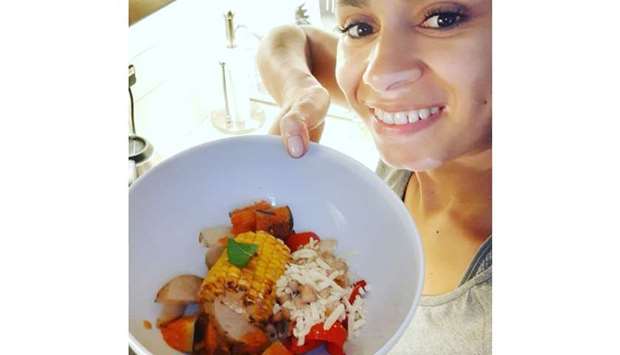“You are what you eat is a term that I consider during food shopping trips, cooking and snacking. Fuelling your body with the best nutrition will contribute to your wellness, health and welfare”.
Ceri Jones is a qualified nutritionist based in Doha with a BSc in Human Nutrition from London Metropolitan University, UK. As a committed sports person, she has always participated in different activities while growing up — playing netball, going to the gym, and participating in athletics. She soon realised that while training for sports that nutrition was an essential part of fuelling the body to replenish it and improve sports performance. Due to this new consideration, she decided to pursue a degree in nutrition.
Talking to Community, the trained nutritionist shed some light on the kind of food people need to take and what to avoid during the hot and humid summer.
Ceri primarily stresses on keeping oneself hydrated during the hot weather. “To keep yourself hydrated, aim to drink a minimum of two litres of water every day to ensure sufficient hydration especially when the temperature is above 30C. Those who most vulnerable during hot conditions are the elderly, people with conditions such as diabetes, young children and people working or exercising outdoors.
“Our bodies sweat more in hot weather, it is really important to replenish lost water levels. Our physical thirst is not a very reliable indicator of how dehydrated we are [urine colour is better], so you should try to drink plenty before you feel parched. Try not to drink too much caffeine as they are diuretics that can increase dehydration. Foods with high water content such as strawberries, cucumber, lettuce, celery and melon can also help you stay hydrated. Consume these throughout the day or keep these kind of fruit snacks in your bag or take them with you to work so you can consume gradually throughout the day.”
The nutritionist is all out for consuming a variety of food instead of sticking to some certain kind of stuff to remain healthy. “As a nutritionist, I am not an advocate of dieting, my passion is to help those to understand nutrition, and how to obtain healthy habits and long-term healthy lifestyle changes. I recommend consuming all of the macronutrients such as protein, carbohydrates and fat along with a range of fruits and vegetables. If you are a vegan or vegetarian, aim to consume lentils, chickpeas and oats for your protein alternatives.
“For many years, carbohydrates and fat have received a lot of negative media in the UK but fats are essential for absorption of some of the essential vitamins – A, D, E, K – and carbohydrates are essential in providing energy for the body. Variety is very important. Aim to follow – the more colourful, the better – approach. Often consumers eat the same fruit and vegetables a day but for the best results, variety is essential as each will provide different nutritional properties in aiding the body so eating bananas for potassium, raspberries for vitamin C and carrots for vitamin A. I ensure to consume a minimum of five large pieces of fruit and vegetables per day, a minimum of 100g in each portion.”
In response to a question on what kind of food intake is helpful for the residents of Qatar during the hot and humid weather, Ceri said: “I would highly recommend carrying a one-litre-bottle of water with if you can. And it may be useful to add cuts of fruits in the bottle such as lemon and oranges for your vitamin C, strawberries, and cucumber to increase your consumption of vitamins and minerals.
“As a qualified nutritionist, I do not advise or consume any shop bought vitamins and minerals from large businesses but aim to obtain all my nutrients from whole foods and fluids. During hot and humid weather, aim to consume sources that have got vitamin C such as oranges, lemons, limes and grapefruit each day.”
For further support and guidance on how to adopt a healthy relationship with food: Contact Ceri on 50424263, email at [email protected] and follow her on Instagram: @mslightbrightlife

u201cTry not to drink too much caffeine as they are diuretics that can increase dehydration. Foods with high water content such as strawberries, cucumber, lettuce, celery and melon can also help you stay hydrated. Consume these throughout the day or keep these kind of fruit snacks in your bag or take them with you to work so you can consume gradually throughout the dayu201d u2014 Ceri Jones
